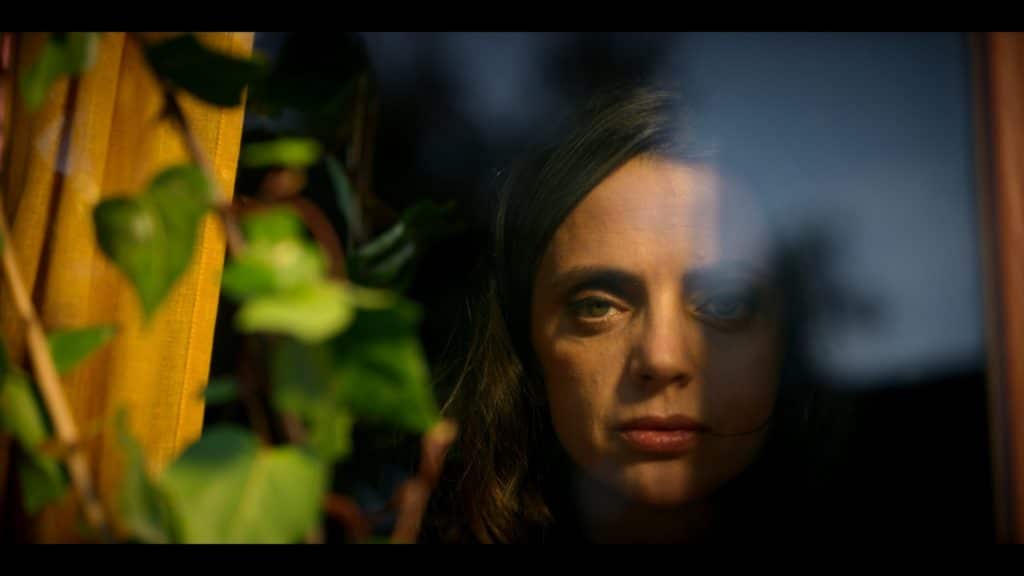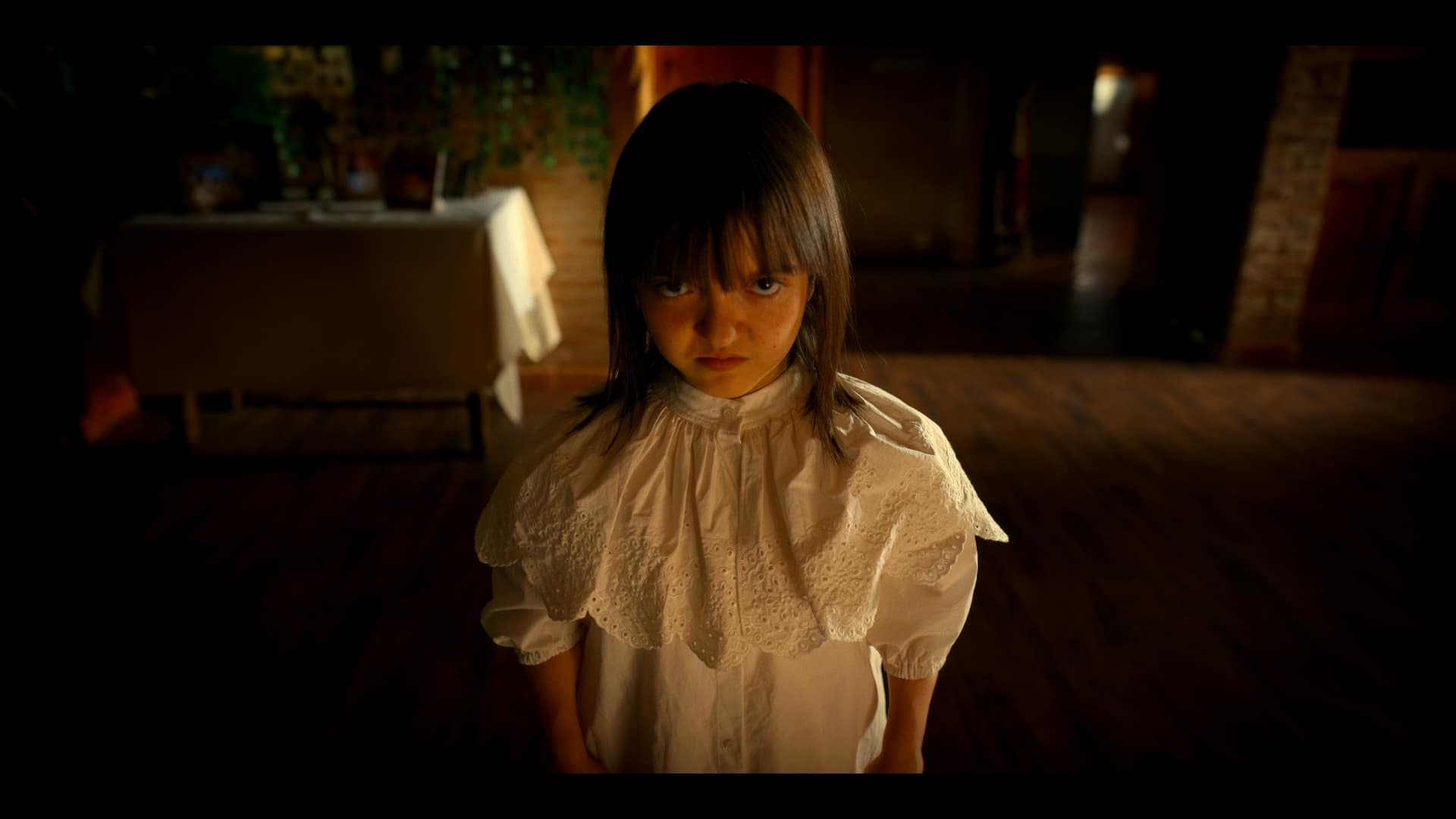
Everyone Will Burn (Y todos arderán) is a film of many modes: it moves from distressing content to bizarre, skittish black comedy, from historical curse to pastiche of small-town life. It divides up its rather abundant two-hour (or as near as damnit) running time between horror tropes and the self-indulgence of blasting a righteous hole right through an unfeeling, unsympathetic community. But above all else, it starts with one unpleasant, questionable scene which will almost certainly invite regular horror viewers to ponder one particular plot possibility. María José (Macarena Gómez) has endured years as a local pariah since the death of her son, and has finally decided to commit suicide: the film opens without her in shot, but her tortured breathing, as she gazes down from the ledge of a bridge, tells us that this decision is agony. She is suddenly disturbed by a child’s voice: a little girl approaches her, calling her ‘mama’.
It is such an outlandish event that María José climbs back down and tries to help the child, who is dirty, dishevelled, and unable to account for herself – her name, her parents, or what she is doing out there. The girl seems to have achondroplasia, which makes her frilly (if filthy) clothing a little hard to read, age-wise; still, a nervy, gabbling, still-living María José feels she has little choice but to drive back to town with her, where she plans to seek police support to reunite her with her parents. Well, the police end up coming to her for one reason and another, but the girl has strange abilities to get rid of anyone who stands in her ‘mother’s’ way. The only thing which matches this surreal and threatening situation is in how María José instantly adapts, taking the girl home. True, the girl – who eventually gives her name as Lucia (Sofía García) – won’t be readily countermanded, but the new normal lands strangely quickly.
María José does, of course, try to decipher what’s going on when she can, and even seeks spiritual guidance from local minister Father Abelino (Germán Torres) but consolation is not forthcoming in Rozas del Monte; he’s less interested in her personal plight and more interested in…a strange prophecy, natch, which declares that ‘two souls created under torment will become one’. This prophecy is noted in the opening credits, and accounts for many of the events which later follow. Unluckily for María José, her new surrogate family is at the centre of this – no doubt abetted by her outsider status, which has made her vulnerable to far more than local pranks and gossip. Little wonder that, after the initial shock, María José seems perfectly happy for Lucia to disrupt the norms of this dreadful town. However, other residents are readying themselves to restore order, at the cost of a long silence of necessity.
From the outset, the dynamic of the film feels warped, hovering between uncomfortable character study and – much as it sounds unlikely – a kind of bleak farce, inviting us to dislike Rozas del Monte’s small-town vibes and people as much as Lucia clearly does. We see significant things getting overlooked and petty things taking centre stage; it’s an age before we really get to the heart of what is unfolding here, so much time do we spend on pancake recipes, intra-female feuding and the dangers of the suburbs. Perhaps we do need that breathing space around some of the plot developments. It does feel, though, that the Catholic context which runs throughout the film can be partly lost on those who have limited knowledge about Catholicism, as much as we’re all well-prepped for devils and demons to rock up in horror films by now; some of the resolutions offered were, for this reviewer, a little hard to read. There’s a lot more to it here though, from investigating officers who pause to admire custom crucifixes to a priest who attends emergencies alongside the police – surely a step beyond the regular church duties – right through to the opening gambit about nuns, prophecy and prophecy-adjacent violence. The scriptures are both a beloved guide and counsel, and a portentous warning about bad things to come. People accept all of this as normal, because at least a large share of it probably is.
Macarena Gómez and Sofía García are a surprisingly tight duo here, with Gómez playing her part like a jangling, tightly-wound spring (albeit very stylishly dressed) and García – in what looks like her first acting credit, ever – successfully staying ambiguous, perhaps a force for evil, or perhaps a force for good; here to comfort a woman left with nothing or perhaps here to wreak havoc. Running throughout the film are insinuations, if we can call them that, about Lucia’s dwarfism, which are rather uncomfortable – she is referred to as monstrous, a ‘thing’ and worse, in ways which probably wouldn’t ordinarily survive the script edit, certainly in the UK or North America. But our sympathies eventually lie more and more with her, and certainly with María José, despite the issues which begin to affect the film. Things become unnecessarily protracted. Heavy with dialogue (and badly-bodged subtitles on the screener, which are awash with failed HTML tags), the film slows significantly around the ninety-minute mark and struggles to accommodate a raft of different elements. So Everyone Will Burn does lose its way, then struggles to bring everything together in meaningful terms; that being said, it does hold onto a few pleasing scenes, which it places well. Ultimately, the initial shifts in tone – compounded by the film’s length – stop it from being a straight-up success, but seeing Gómez doing her best Isabelle Adjani has its merits, whilst García is a great player throughout.
The North American debut of Everyone Will Burn (Y Todos Arderan) will take place at Fantastic Fest in Austin. For more information, please click here.
